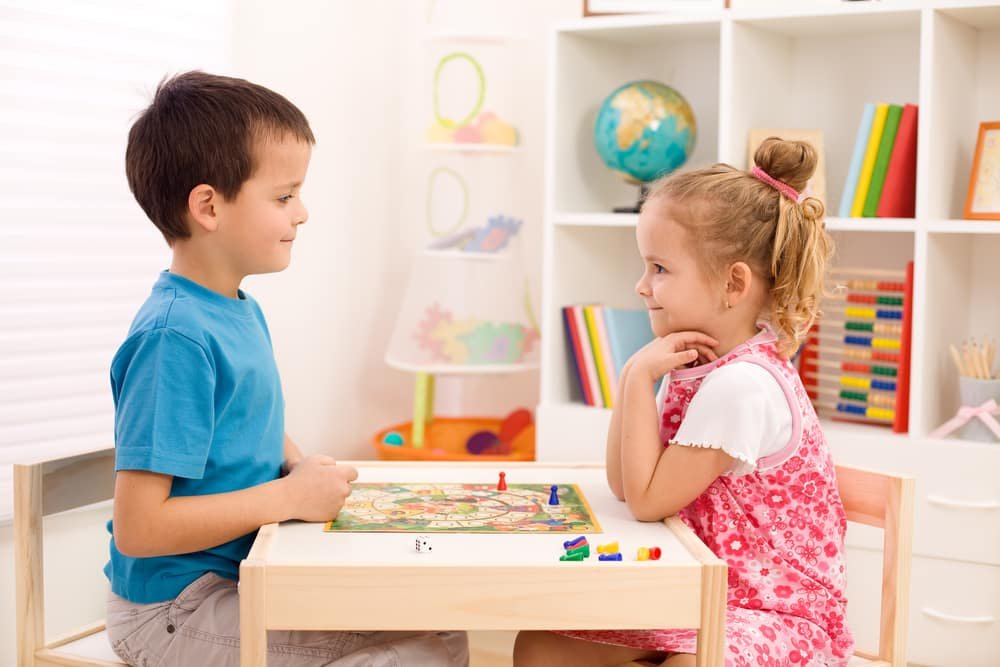
Kids turning 6 are entering an important developmental stage in their life. They’re exiting the toddler stage, which means they will be seeking out more complex forms of entertainment and stimulation. Games for six year olds should have a healthy combination of education, entertainment and imagination to keep them interested and always learning or doing something new. At this age, kids should be learning communication, problem solving and social skills to prepare them for the next stage of their education. As they’ve probably said already, they’re not a toddler anymore and it’s time to start challenging them a bit more! Let’s look at a few games for 6 year olds that will help them start to develop these skills and their confidence in the process!
Rhyming Games
Not all games need to come out of a box to help your child develop their language skills. Simple rhyming games can be a really fun way to learn new words, make new associations and have a few laughs along the way! Starting with small words and moving up is a great way to progress, and you could even think about creating some flash cards for your little one to keep track of your favorite rhymes and words together.
Chess and Checkers
Checkers and Chess are both great games for kids starting to develop more complicated pattern recognition. They also present some simple problem solving, strategy, and maybe even some healthy competition! Games that present problems for kids to solve are great for developing more advanced critical thinking skills and teaches them how to make decisions for themselves. Even in small ways, you’re developing your child’s independence by playing games with them.
Memory Card Games
These games are a classic staple for any family! Young parents will likely remember taking a big pile of square panels and laying them face down. Then, you would have to match the images on the back to win the game. Memory games flex important recognition skills and they’re lots of fun with various images you can choose from. Today, you can play memory games on your devices making them easier to play with family members who live far away.
Monopoly
Everyone probably has fond memories of playing monopoly, and it’s a great game to practice both counting and motor skills for a 6 year old. This is another game that also flexes problem solving skills and forces them to think critically about their decisions throughout the game. A fair warning though that monopoly can ignite fierce competition, especially when your little ones start beating you! Jokes aside, competition is actually a good thing for kids to experience as it teaches them to be a good sport when playing with others. Cooperative games like monopoly show them how to compete while still having fun and playing nice with others.
Dice Games
Board games like Jumanji, Candyland and Sorry! all use dice which are great for counting and spatial reasoning skills. They also require simple reading skills which are great to practice in the context of family fun. Classic games like these are easy enough for everyone to have fun, but still use important math and reading skills to play.
Imaginative Play
One of the most important things for kids to do at a young age is freely use their imagination. Role playing is a great way to do this, it gives them an opportunity to explore the wildest parts of their minds and when you as their parent encourage that, it shows them that you value their creativity and interests. You could even put on an improvised play for the whole family on their favorite subject, story or fantasy.
The best games for kids coming out of the toddler phase are games that encourage important life skills that they’ll need as they get older. Kids at this age will be hungry for more complex ideas, thoughts, words and activities to keep them engaged and stimulated. Without that, they’ll get bored and frustrated with the activities they do have available. Encourage them to develop critical thinking skills, reading, math and pattern comprehension by changing the games they play to be more complicated and engaging.
Games that kids can play with other people are also important for their development. These teach cooperative learning, good sportsmanship and collaboration. All of which are essential life skills that will help your child make friends, relationships and connections later in your life. Games are such an important part of childhood development, so lean into and make it part of the fun of being a parent!
ATTENTION READERS
We See The World From All Sides and Want YOU To Be Fully InformedIn fact, intentional disinformation is a disgraceful scourge in media today. So to assuage any possible errant incorrect information posted herein, we strongly encourage you to seek corroboration from other non-VT sources before forming an educated opinion.
About VT - Policies & Disclosures - Comment Policy



